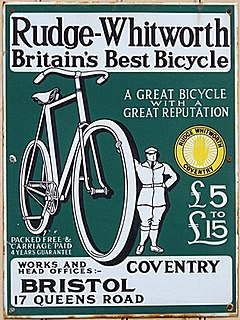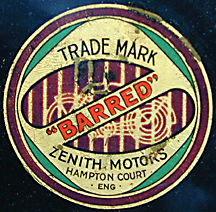Related Research Articles
Coventry Victor was a British motorcycle and car manufacturer. Originally Morton & Weaver, a proprietary engine manufacturer in Hillfields, Coventry, founded in 1904, the company changed its name to Coventry Victor Motors in 1911. The company closed in 1971.

Excelsior, based in Coventry, was a British bicycle, motorcycle and car maker. They were Britain’s first motorcycle manufacturer, starting production of their own ‘motor-bicycle’ in 1896. Initially they had premises at Lower Ford Street, Coventry, and 287-295 Stoney Stanton Road, Hillfields, Coventry, Warwickshire before moving to Kings Road, Tyseley, Birmingham in 1921.

JA Prestwich Industries, was a British engineering equipment manufacturing company named after founder John Alfred Prestwich, which was formed in 1951 by the amalgamation of J.A.Prestwich and Company Limited and Pencils Ltd.
Wooler was a British manufacturer of motorcycles and automobiles, founded by engineer John Wooler in 1911 based in Alperton, Middlesex. The company became known for its unconventional designs which included several fore-and-aft twins, a vertical camshaft single cylinder machine, a transverse-four beam engine, and a transverse flat four. Most machines possessed Wooler's enduring design features of a petrol tank which extended past the steering head.

Coventry Premier Limited owned a British car and cyclecar manufacturing business based in Coventry from 1912 to 1923. It changed its name from Premier Cycles to Coventry Premier Ltd in November 1914.

The New Hudson Cycle Co. was originally started in 1890 by George Patterson, and manufactured 'safety' bicycles in Birmingham. In 1903 they produced their first motorcycle, but times became tough for Patterson after one of his sons died in WW1 and the other lost a leg. The family sold the factory to HJ Bructon after WW1, and in 1920 the company was reformed as New Hudson Ltd.

The Cotton Motor Company, was a British motorcycle manufacturer of 11a Bristol Road, Gloucester, and was founded by Frank Willoughby Cotton in 1918. F.W. presided over the company until his retirement in 1953. The company was reconstituted as E. Cotton (Motorcycles) Ltd, and traded until 1980. The marque was later resurrected in the late 1990s by a business which manufactured replicas of earlier machines.

Rudge Whitworth Cycles was a British bicycle, bicycle saddle, motorcycle and sports car wheel manufacturer that resulted from the merger of two bicycle manufacturers in 1894, Whitworth Cycle Co. of Birmingham, founded by Charles Henry Pugh and his two sons Charles Vernon and John, and Rudge Cycle Co. of Coventry.

Douglas was a British motorcycle manufacturer from 1907–1957 based in Kingswood, Bristol, owned by the Douglas family, and especially known for its horizontally opposed twin cylinder engined bikes and as manufacturers of speedway machines. The company also built a range of cars between 1913 and 1922.
Rex, Rex Motorcycles, Rex-Acme, was a car and motorcycle company which began in Birmingham, England in 1900. Rex soon merged with a Coventry maker of bicycles and cars named Allard and then later in 1922 the company merged with Coventry's 'Acme' motorcycle company forming 'Rex Acme'. The company existed until 1933, and, in its heyday, was considered one of the greatest names in the British motorcycle industry.

The Carden was a British 4 wheeled cyclecar made from 1914 by Carden Engineering originally based in Farnham, Surrey but moving in 1914 to Teddington, Middlesex and in 1919 to Ascot, Berkshire.

The Tamplin was an English automobile manufactured by Tamplin Motors from 1919 to 1923 in Kingston Road, Staines, Middlesex and from 1924 to 1925 in Malden Road, Cheam, Surrey.
Blackburne was a trade name of Burney and Blackburne Limited a British manufacturer of motorcycles from 1913 to 1922 at Tongham near Farnham, Surrey. They were also a major supplier of engines to other motor cycle and light car makers and continued to make these until 1937. Burney and Blackburne also made small aircraft engines.
The Hampton was a British car made by the Hampton Engineering Company which was based in Kings Norton, Birmingham from 1912 to 1918 and at Dudbridge in Stroud, Gloucestershire from 1918 to 1933

Osborn Engineering Company was a British manufacturer of motorcycles, which sold its machines under the OEC brand name.

Zenith Motorcycles was a British motorcycle and automobile manufacturer established in Finsbury Park, London in 1903, by W.G. Bowers. Automobile manufacture only lasted from 1905–1906. The first Zenith motorcycle was the 'BiCar' of 1903, based on Tooley's Bi-Car design, which was purchased by Zenith for its own production. The BiCar was a unique design with hub-center steering and a low-slung chassis with the engine centrally fixed.

The Ruby Cycle Co Ltd. was a British motorcycle manufacturer based in Ancoats Manchester. Founded in 1909 the factory produced a range of motorcycles under the Royal Ruby brand until 1932.

The Autocrat was a British car manufacturer operating from 1913 to 1926. The company operated from premises in the Balsall Heath area of Birmingham. Unusually for the time the company seems to have been run by two women, Ivy Rogers and Miss Howell.
The Lecoy was a short lived British 4-wheeled cyclecar made from 1921 to 1922 by the Lambert Engineering Co Ltd, St Hilda's Works, Northolt Road, Harrow, Middlesex.
F. E. Baker Ltd was a British motorcycle engine and cyclecar engine manufacturer based in the Precision Works, Moorsom Street, Birmingham, England. Founded in 1906 by Frank Edward Baker, the company produced motorcycle engines under the Precision trademark until 1919. Precision engines were used by a wide range of motorcycle manufacturers in the United Kingdom and in other parts of the Commonwealth and were also used in cyclecars. Many manufacturers used the 'Precision' trademark as part of their model names, and in 1912 there was a 'Precision' motorcycle sold in Australia, but it is unclear if this was manufactured by F.E. Baker or just permitted use of the trademark by a motorcycle manufacturer.
References
- 1 2 3 4 5 6 7 8 CJ Ayton (1985). Guide to Pre-War British Motorcycles. Temple Press. ISBN 0600351408.
- 1 2 3 Baldwin, Nick (1994). The Automobile A-Z of Cars of the 1920s. Bideford, England: Bay View Books. p. 36. ISBN 1901432092.
- ↑ Culshaw; Horrobin (1974). Complete Catalogue of British Cars. London: Macmillan. ISBN 0-333-16689-2.
- ↑ Tragatsch, Erwin (2000). The New Illustrated Encyclopedia of Motorcycles. London: Quantum Publishing. p. 560. ISBN 1861603428.